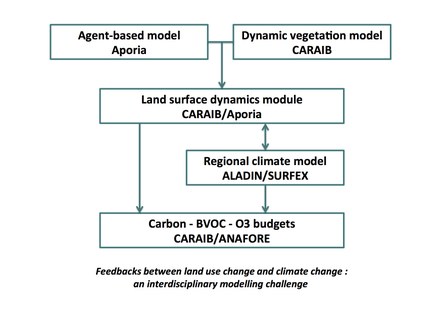MASC
Modelling and Assessing Surface Change impacts on Belgian and Western European climate
Funding agency: Belgian Federal Science Policy (BELSPO)
Research associate: Bos Debusscher
Promoters: Robert De Wulf, Frieke Van Coillie
Acronym: MASC
Duration: 10/2013 – 12/2017
Project objectives
With this assessment tool combining high-resolution models of climate, land surface dynamics and socio-economic processes, we will:
- Produce high resolution projections of climate and land use/land cover changes at the decennial scale (2013-2030) over Belgium and Western Europe, taking the feedbacks between all these changes into account ;
- Assess the impacts of expected land surface changes related to ecosystem cover and socio-economic use on the future climate of Belgium and Western Europe;
- Evaluate the impacts of the resulting climate and land surface dynamics on the carbon budget of land ecosystems.
Our work will start by adapting a land surface dynamics (LSD) module composed of a dynamic vegetation model, calculating the productivity and growth of natural ecosystems, forests, pastures and crops, and an agent-based model, determining the shifts in land use and land cover resulting from decision rules applied to a set of agents. These two models will be integrated and up-scaled to be applicable to the whole Belgian territory, using various spatial environmental data together with socio-economic and policy information. This LSD module will be validated over the recent period. It will be made consistent with SURFEX, the surface scheme of the ALADIN regional climate model that will be used in the project, as well as with the ECOCLIMAP II surface database used by SURFEX. Then, we will develop a coupler for the exchange of information between the LSD module and SURFEX to allow simulations of ALADIN with a fully dynamic land surface. These simulations will be run over Western Europe at 20 km and over Belgium at 4 km, for the period 2000-2030 (first objective). Over Belgium, the LSD module will be used in concert with the regional climate model, using synthetic agents in the agent-based model defined specifically for the Belgian territory. The simulation results will be analysed in order to identify and quantify the feedbacks linking the climate and the land surface systems, e.g., by comparing separate simulations with and without land surface changes. An assessment of the impacts of projected land use/cover changes on regional climate (second objective) and terrestrial ecosystem carbon cycle (third objective) evolution will also be undertaken.
The research end-products will consist in (1) climate and land use change dynamic projections at the horizon 2030, at high spatial resolution over Belgium and Western Europe, and (2) an assessment of the impacts on land ecosystems and their carbon budget.
More information can be found at: www.masc-project.be
Project partners
- FORSIT, Research Unit – University of Ghent (Ugent, Belgium)
- Institut d'Astrophysique et de Géophysique - University of Liège (Belgium) www.ulg.ac.be
- Royal Meteorological Institute of Belgium (Belgium) www.meteo.be
- Department of Geography - University of Namur (Belgium) www.unamur.be
- PLECO, Research Unit - University of Antwerp (Belgium) www.uantwerpen.be
- Centre National de Recherches Météorologiques (France) www.cnrm-game-meteo.fr
